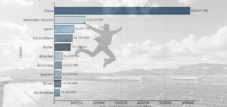
The development of solar energy in Germany shows a positive picture. The imminent exceeding of the 100 GW mark is not just a symbolic success - Image: Xpert.Digital
☀️⚡ Germany's solar energy close to the 100 GW solar mark: Why solar expansion is creating new challenges for electricity stability
🌱 Germany is on the threshold of a significant milestone in its energy transition
Cumulative solar capacity is approaching an impressive 100 gigawatts (GW). This growth underscores the country's strong commitment to renewable energy and reducing greenhouse gas emissions. The Federal Association of the Energy and Water Industry (BDEW) predicts an increase of 17.5 GW in new photovoltaic systems for 2024. 7.6 GW was installed in the first half of 2024, bringing total capacity to over 90 GW by the end of June.
This remarkable increase is part of a broader trend towards the massive expansion of solar energy in Germany. The federal government has set itself ambitious goals and aims to achieve a total solar energy capacity of 215 GW by 2030. To support this goal, numerous legal adjustments and initiatives have been introduced. A central element is the so-called “solar package”, which aims to make the installation of both large and small solar systems easier and reduce bureaucratic hurdles.
🔆 Historical development of solar energy in Germany
The development of solar energy in Germany has a long history. The country began to promote the use of photovoltaics as early as the 1990s. A decisive stimulus was the Renewable Energy Sources Act (EEG) of 2000, which set fixed feed-in tariffs for electricity from renewable sources. This law created economic incentives for investment in solar energy and led to a boom in solar installations.
In the following years, Germany experienced a rapid increase in installed solar capacity. Despite some adjustments to the funding conditions, the EEG remained a central pillar for the expansion of renewable energies. The reduction in feed-in tariffs in recent years reflects the falling costs of solar technology and shows that photovoltaics is increasingly competitive without subsidies.
👥 Social participation and decentralization
Another important factor for the success of solar energy in Germany is the strong participation of citizens. Many solar systems are owned by private individuals, farmers or energy cooperatives. This decentralized model promotes acceptance and enables the energy transition to be placed on a broad social basis. Citizen participation increases awareness of sustainable energy supply and promotes local value creation.
🔧 Technological advances and innovations
Technological innovations have significantly improved the efficiency and cost-effectiveness of solar systems. Bifacial solar modules, which can absorb light from both sides, increase energy yield. The integration of photovoltaics in building facades and vehicles opens up new fields of application. The digitalization of the energy sector also offers opportunities to increase the efficiency and flexibility of the power grid. Intelligent networks (“smart grids”) can control energy flows in real time and thus improve network stability.
⚡ Challenges in network integration
Despite these positive developments, there are also challenges. One of the biggest concerns concerns network stability. The unregulated feed-in of systems with an output of less than 100 kilowatts can lead to an overload of the power grid on sunny days. The Federal Association of the Energy and Water Industry (BDEW) warns that without appropriate control mechanisms, the risk of network instabilities increases. To counteract this problem, regulatory measures are planned to improve the controllability of new systems.
Suitable for:
🔋 Energy storage as the key to flexibility
The fluctuating nature of solar energy requires flexible solutions to balance supply and demand. This is where energy storage comes into play. The expansion of storage technologies such as battery storage and pumped storage power plants is essential to store excess energy and feed it back into the grid when necessary. Technological innovations in battery storage have already reduced costs, but further progress is needed. Long-term storage solutions, such as power-to-gas technologies, could play an important role in the future.
💼 Economic impact and jobs
The economic impact of expanding solar energy is significant. The solar industry creates jobs in the areas of manufacturing, installing and maintaining systems. It also contributes to strengthening the German export economy, as technologies and know-how are in demand internationally. Technological advances and falling costs for solar modules have increased the attractiveness of photovoltaic systems for both private individuals and companies.
📜 Political framework and goals
With the Climate Protection Program 2030 and the Climate Protection Act, the federal government has created further framework conditions to reduce CO₂ emissions. These policy measures aim to meet the goals of the Paris Climate Agreement and limit global warming to well below 2 degrees Celsius. In order to achieve the ambitious goals by 2030, incentives must continue to be set and obstacles reduced. Bureaucratic processes when approving solar systems should be simplified and accelerated.
🌎 Environmental benefits and climate protection
The environmental benefits of solar energy are undeniable. It generates electricity without direct CO₂ emissions and reduces dependence on fossil fuels. It also helps improve air quality and reduce other harmful emissions. The expansion of renewable energies is a central component in achieving climate goals and securing a sustainable future.
🎓 Education and social engagement
In the education sector, it is important to raise awareness of renewable energies. Educational initiatives and programs can help inspire the next generation about sustainable technologies and train professionals for the growing industry. The energy transition is not just a technical or political task, but also a social one. It requires the willingness of all actors to accept change and actively shape it.
🤝 International cooperation and role model function
From an international perspective, Germany is one of the pioneers in the field of renewable energies. The success in expanding solar energy can serve as a model for other countries that are also striving to transition to a sustainable energy supply. The transfer of knowledge and technology helps to build sustainable energy supply systems worldwide and combat climate change. The challenges of climate change require joint action at a global level.
🔮 Future prospects and continuous development
If you look into the future, there will be further developments and innovations in the field of solar energy. The role of artificial intelligence and big data is becoming increasingly important in optimizing solar systems. With accurate weather forecasts and real-time monitoring, plant operators can maximize performance and plan maintenance more efficiently.
It is important to emphasize that solar energy expansion cannot be viewed in isolation. It is part of a broader transformation process that also includes the expansion of other renewable energies such as wind power, improving energy efficiency and promoting electromobility. The combination of these measures contributes to achieving climate goals and securing a sustainable future.
🌟 Development of solar energy in Germany
The development of solar energy in Germany shows a positive picture. The upcoming 100 GW mark is not only a symbolic achievement, but also reflects the real progress being made in transforming the energy system. With continuous efforts and adjustments, Germany can achieve its ambitious goals while serving as an example for other nations. The energy transition is a long-term project that requires commitment, innovation and collaboration. Germany is well on the way to realizing its vision of a sustainable energy future.
📣 Similar topics
- 📣 Solar power boom in Germany: The 100 GW mark is approaching
- ☀️ Solar energy and grid stability: challenges of the future
- 📊 100 gigawatts of solar energy: A milestone in the energy transition
- ⚡ Grid overload caused by photovoltaics: focus on possible solutions
- 🏡 Citizen effect: The role of private solar systems in Germany
- 🌍 Climate goals 2030: The importance of solar energy
- 🤖 Innovations in solar technology: advances and potential
- 💡 Energy storage as the key: flexibility for the energy transition
- 📜 The solar package: reduce bureaucratic hurdles, accelerate expansion
- 🇩🇪 Germany as a role model: solar energy and international cooperation
#️⃣ Hashtags: #Energy Transition #Solar Energy #Climate Protection #RenewableEnergy #Grid Stability
🎯🎯🎯 Benefit from Xpert.Digital's extensive, five-fold expertise in a comprehensive service package | BD, R&D, XR, PR & Digital Visibility Optimization
Benefit from Xpert.Digital's extensive, fivefold expertise in a comprehensive service package | R&D, XR, PR & Digital Visibility Optimization - Image: Xpert.Digital
Xpert.Digital has in-depth knowledge of various industries. This allows us to develop tailor-made strategies that are tailored precisely to the requirements and challenges of your specific market segment. By continually analyzing market trends and following industry developments, we can act with foresight and offer innovative solutions. Through the combination of experience and knowledge, we generate added value and give our customers a decisive competitive advantage.
More about it here:
🔆🌍 Ranking of solar power solar champions: Who dominates global solar power? The top 10 at a glance
Top ten solar energy countries with the highest cumulative solar capacity in 2023 – Image: Xpert.Digital
Solar energy has established itself as one of the most important technologies for generating renewable energy over the last two decades. Countries around the world are investing heavily in the development and expansion of solar projects to address the challenges of climate change, reduce their energy dependence and promote sustainable economies.
- China: With an impressive capacity of approximately 609,921 MW, China is the world leader in solar energy.
- United States: The USA follows with an installed capacity of 139,205 MW.
- Japan: Japan has a solar capacity of 89,077 MW.
- Germany: Germany comes in fourth place with a capacity of 81,739 MW.
- India: India has an installed capacity of 73,109 MW.
- Brazil: The capacity in Brazil is 37,449 MW.
- Australia: Australia has a solar capacity of 32,612 MW.
- Spain: Spain has an installed capacity of 31,016 MW.
- Italy: In Italy the solar capacity is 29,795 MW.
- Netherlands: The Netherlands has a capacity of 23,904 MW.
More about it here:
We are there for you - advice - planning - implementation - project management
☑️ SME support in strategy, consulting, planning and implementation
☑️ Creation or realignment of the digital strategy and digitalization
☑️ Expansion and optimization of international sales processes
☑️ Global & Digital B2B trading platforms
☑️ Pioneer Business Development
I would be happy to serve as your personal advisor.
You can contact me by filling out the contact form below or simply call me on +49 89 89 674 804 (Munich) .
I'm looking forward to our joint project.
Xpert.Digital - Konrad Wolfenstein
Xpert.Digital is a hub for industry with a focus on digitalization, mechanical engineering, logistics/intralogistics and photovoltaics.
With our 360° business development solution, we support well-known companies from new business to after sales.
Market intelligence, smarketing, marketing automation, content development, PR, mail campaigns, personalized social media and lead nurturing are part of our digital tools.
You can find out more at: www.xpert.digital - www.xpert.solar - www.xpert.plus

